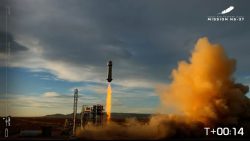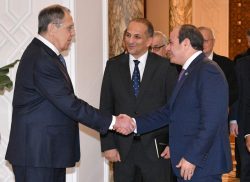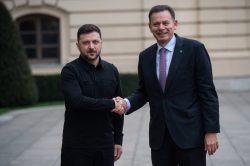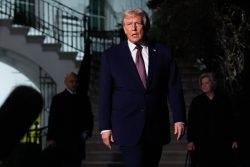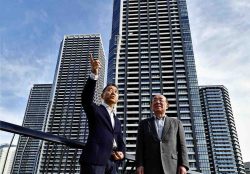A Peace Summit for Ukraine Opens This Weekend in Switzerland. But Russia won’t be Taking Part
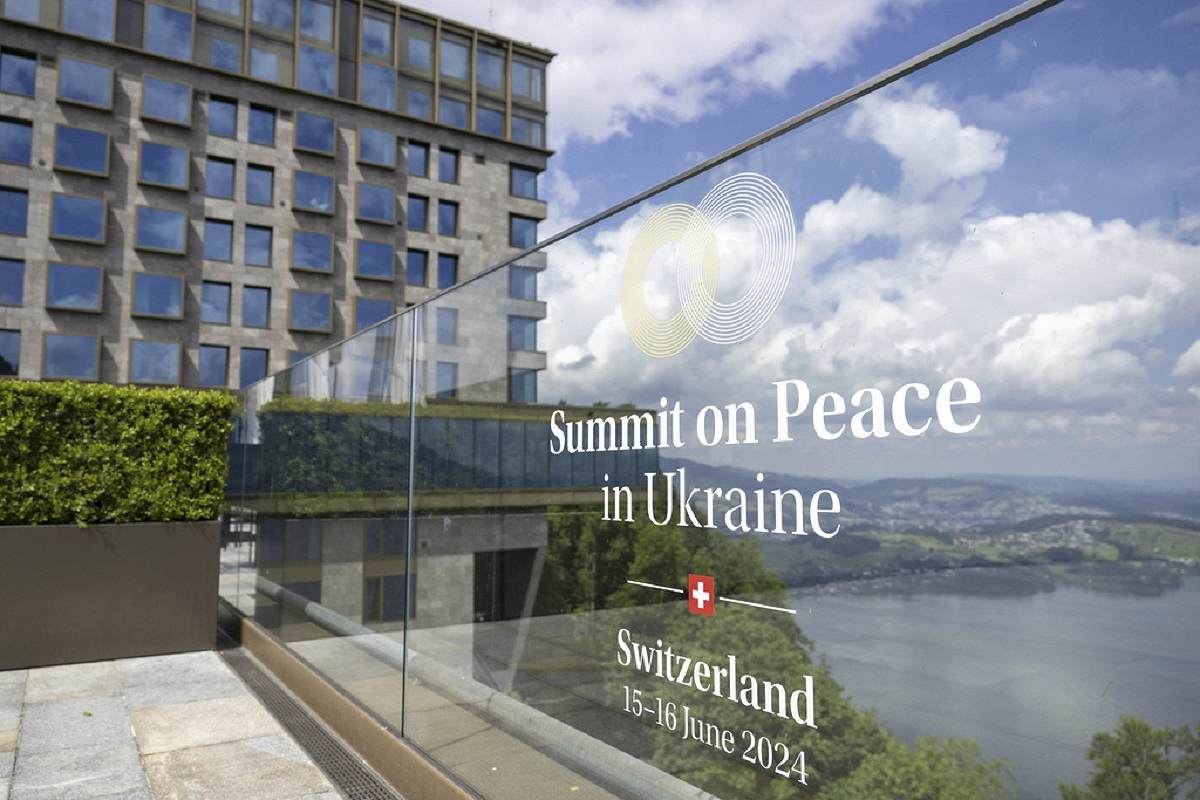
The logo of the peace summit is pictured in Buergenstock, Switzerland, Thursday, June 13, 2024.
10:34 JST, June 15, 2024
GENEVA (AP) — Switzerland will host scores of world leaders this weekend to try to map out the first steps toward peace in Ukraine even though Russia, which launched the war, isn’t attending.
Ukrainian President Volodymyr Zelenskyy’s government didn’t want Russia involved. But the Swiss insist that Russia must be involved at some point, and hope it will join the process one day.
The conference on Saturday and Sunday, underpinned by elements of a 10-point peace formula presented by Zelenskyy in late 2022, is seen as a largely symbolic effort on the part of Kyiv to rally the international community and project strength against Russian might.
But the question looming over the summit will be how the two countries can eventually end the war without Moscow attending.
The conflict has also led to international sanctions against nuclear-armed Russia and raised tensions between NATO and Moscow. The summit comes as Russian forces have been making modest territorial gains in eastern and northeastern Ukraine.
Here’s a look at what to expect from the weekend gathering at the Buergenstock Resort on a cliff overlooking Lake Lucerne.
Who’s going?
Among the stakes will be simple optics: How many countries the Swiss and Ukrainians can draw in.
Swiss officials sent out around 160 invitations. About 90 delegations, including a handful of international organizations like the United Nations, will attend. Roughly half will be from Europe. Zelenskyy led a diplomatic push in Asia and beyond to rally participation.
Several dozen attendees will be heads of state or government, including from France, Poland, Japan, the United Kingdom, Germany and Canada.
U.S. Vice President Kamala Harris is meeting Zelenskyy on Saturday on the sidelines of the summit, and she’s also expected to deliver an address.
Who are the major no-shows?
U.S. President Joe Biden, who was wrapping up a visit to Italy on Friday for a Group of Seven summit, opted to dispatch Harris and national security adviser Jake Sullivan.
Biden and Zelenskyy signed a 10-year security agreement Thursday at the G7 summit.
Russia’s key ally China won’t attend. The Chinese Foreign Ministry has said it believes a peace conference should involve both Russia and Ukraine.
The final list of attendees isn’t expected until late Friday, and question marks remain about how key developing countries like India, Brazil and Turkey might take part, if at all.
But so far, under half of the 193 U.N. member countries are planning to attend, testifying to a wait-and-see attitude in many capitals.
“Russia does not have a lot of allies in this particular situation,” said Keith Krause, a professor of international security studies at the Graduate Institute in Geneva. “It has a number of states that are susceptible to being pressured, and a few that actually wish to stand aside, from what they see as a northern, U.S.-Russia, NATO-Russia confrontation.”
What can be expected?
Naysayers say the conference will be short on substantial achievements. President Vladimir Putin’s government doesn’t believe Switzerland, which has lined up behind European Union sanctions on Moscow over the war, is neutral.
Putin said Friday that “without Russia’s participation, without an honest and responsible dialogue with us, it is impossible to reach a peaceful solution in Ukraine and in general regarding global and European security.” He suggested that the conference is ”just another ploy to divert everyone’s attention.”
Participants are expected to unite around an outcome document or a joint plan, and Ukraine will have a lot of input. But ironing out language that delegations can agree upon is still a work in progress.
Andriy Yermak, Zelenskyy’s chief of staff, said that Ukrainian officials wanted countries that respect Ukraine’s independence and territorial integrity to be invited. He said the basis of the talks should be a 10-point peace formula that Zelenskyy has presented.
Yermak said Tuesday that Ukraine and the other participants would be preparing a “joint plan” to unite around, “and we’re looking for the possibility in the second summit to invite representative of Russia, and together present this joint plan.”
What is the Ukrainian 10-point peace formula?
Ukraine’s peace plan launched by Zelenskyy outlines 10 proposals that encapsulate the president’s step-by-step vision to end the full-scale invasion, which began in February 2022.
The plan includes ambitious calls, including the withdrawal of Russian troops from occupied Ukrainian territory, the cessation of hostilities and restoring Ukraine’s state borders with Russia, including Crimea.
But Ukraine is unable to negotiate from a position of strength. Moscow’s army has the upper hand in firepower and number of troops, while Kyiv’s momentum has been stalled by delays in Western military supplies.
That is likely why the most contentious elements of the plan aren’t being discussed.
Only three themes will be on the table: nuclear safety, including at the Russia-controlled Zaporizhzhia nuclear plant, humanitarian aid and global food security.
Western officials in Kyiv said these themes cut across international interests and are easy for Kyiv to rally the international community around. But they don’t encompass the tougher issues that can only be resolved with Moscow as a negotiating partner.
Russia’s hesitancy about the conference stems in part from its unwillingness to show any sign of acceptance of the Ukrainian peace formula.
Putin has espoused a deal to be premised on a draft peace agreement negotiated in the early days of the war that included provisions for Ukraine’s neutral status and put limits on its armed forces, while delaying talks on the status of Russia-occupied areas.
What’s the way forward?
Krause, of the Graduate Institute, said that Ukraine needs to emerge from the conference with momentum and renewed commitment from allies on issues like territorial integrity and future relationships — even if NATO and EU membership may be far off.
“I don’t think anybody is particularly deluded that this is going to give birth to a new peace plan, or even to some kind of agreement that stops the hostilities on the battlefield,” Krause said. “But as past wars have shown, including as far back as World War II, discussions about the contours of the peace begin long before the fighting stops on the battlefield.”
"News Services" POPULAR ARTICLE
-

American Playwright Jeremy O. Harris Arrested in Japan on Alleged Drug Smuggling
-

Japan’s Nikkei Stock Average as JGB Yields, Yen Rise on Rate-Hike Bets
-

Japan’s Nikkei Stock Average Licks Wounds after Selloff Sparked by BOJ Hike Bets (UPDATE 1)
-

Japan’s Nikkei Stock Average Buoyed by Stable Yen; SoftBank’s Slide Caps Gains (UPDATE 1)
-

Japanese Bond Yields Zoom, Stocks Slide as Rate Hike Looms
JN ACCESS RANKING
-

Keidanren Chairman Yoshinobu Tsutsui Visits Kashiwazaki-Kariwa Nuclear Power Plant; Inspects New Emergency Safety System
-

Imports of Rare Earths from China Facing Delays, May Be Caused by Deterioration of Japan-China Relations
-

University of Tokyo Professor Discusses Japanese Economic Security in Interview Ahead of Forum
-

Japan Pulls out of Vietnam Nuclear Project, Complicating Hanoi’s Power Plans
-

Govt Aims to Expand NISA Program Lineup, Abolish Age Restriction


